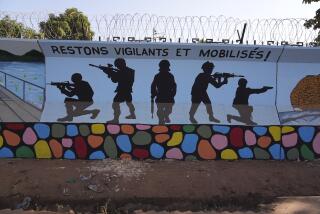Capt. Sankara of Burkina Faso
- Share via
The article about the coup in Burkina Faso (Part I, Oct. 17) left me with a sick and empty feeling. Capt. Thomas Sankara, the head of state and military leader of this small West African country, was killed in the coup, as reported on the wire services, by forces loyal to his chief aide. Perhaps we will never know the full and complete story surrounding what may be seen as just another change in government (the fourth in this decade) for a poor, land-locked African nation. Yet, my personal experience will always serve as a reminder of what could have been.
Ironically, it was one year ago that I met Sankara while in the small market town of Bobo-Dioulasso in the southwestern part of the nation. (I was traveling as a consultant for UNICEF and as part of a torch relay team passing through West Africa participating in a global peace initiative known as the First Earth Run). Sankara, who had championed the “Sport Aid” project in the capital city of Ouagadougou some months earlier, invited us to bring our relay through “Bobo” so that others of his nation from the local region could join in the celebration.
Upon receiving the torch in the town square, Sankara said, “Thank you for peace,” and then, after planting a tree in honor of the event, spoke to the pressing, adulatory crowd in beautiful French. “Peace is a lifelong process,” he said. “And central to that process are the women and children. The first and most important step in this process is education,” he went on. “ . . . And that is where our commitment lies.” He was a person of hope.
We were introduced to Sankara by Stanislas Adotevi, the UNICEF representative in Burkina Faso. Adotevi was formerly a professor of anthropology in Paris where Sankara had studied for a time and was an outstanding student of his. Adotevi told us how everyone was surprised that upon completion of his studies, Sankara, among the best and brightest of his generation, joined the military.
Evidently it was his plan all along to assume control of the country from within the armed forces, which he did in August, 1983, along with his boyhood friend and eventual betrayer Capt. Blaise Compaore. It was then that he changed the name of the nation from Upper Volta to Burkina Faso or Land of Upright Men (Men of Dignity).
History will tell the scholars and others if he has left anything behind after these four short years. I will not have to wait so long. I am proud to have met this Man of Dignity and to have shared his hope.
TED TANNENBAUM
Santa Monica
More to Read
Sign up for Essential California
The most important California stories and recommendations in your inbox every morning.
You may occasionally receive promotional content from the Los Angeles Times.













